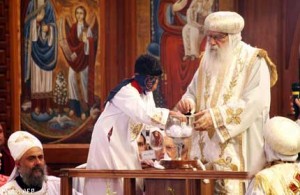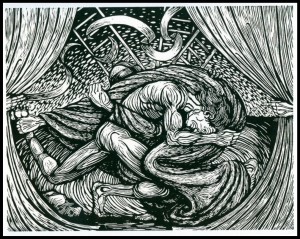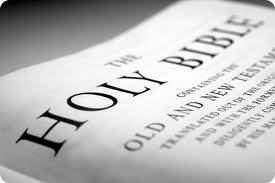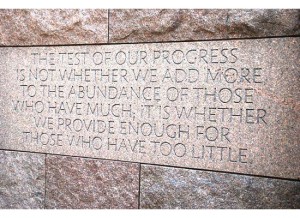====================
This sermon was preached on Sunday, September 9, 2012, at St. Paul’s Episcopal Church, Medina, Ohio, where Fr. Funston is rector.
(Revised Common Lectionary, Proper 18B: Isaiah 35:4-7a; Psalm 146; James 2:1-17; and Mark 7:24-37.)
====================
 If you are a political junkie like me, you’ve been following the campaigns, watching the conventions, reading the editorials, and generally getting angry with one side or the other or both and the whole process. You may have noticed, as I have, that candidates are never alone. They are surrounded by a whole corps, an entire gaggle of handlers, some of whom have the responsibility to make sure the candidate stays “on message”, that he or she makes no “gaffs”. Jesus was surrounded by a gaggle, as well, but these were not handlers and there was no one to keep him “on message” except himself. In fact, the gospel witness is pretty clear that even right up to the end the gaggle that followed him around really didn’t understand the message!
If you are a political junkie like me, you’ve been following the campaigns, watching the conventions, reading the editorials, and generally getting angry with one side or the other or both and the whole process. You may have noticed, as I have, that candidates are never alone. They are surrounded by a whole corps, an entire gaggle of handlers, some of whom have the responsibility to make sure the candidate stays “on message”, that he or she makes no “gaffs”. Jesus was surrounded by a gaggle, as well, but these were not handlers and there was no one to keep him “on message” except himself. In fact, the gospel witness is pretty clear that even right up to the end the gaggle that followed him around really didn’t understand the message!
To be honest, it’s not clear in today’s lesson whether the gaggle is even around. Mark doesn’t say anything about them and the way he writes this story it sounds like Jesus may have gone without them to the city of Tyre, a gentile town north of the sea of Galilee and on the Mediterranean coast in what is now Lebanon. But whether they were with him or not, he doesn’t have anyone there who can stop him making a really awful racist gaff, from calling this foreign woman “a dog”! O.M.G.! Can you imagine what Fox News or MSNBC would have done with this?
Gentle Jesus, meek-and-mild Jesus, love-everyone Jesus, welcome-the-sinner Jesus has just said about the worst, most insulting, most awful thing he could say to a woman who wanted nothing more than to get medical help for her daughter! And make no mistake about it, that is what he has done. He has uttered a racial slur!
Immediately we want to say, “That can’t be! Jesus couldn’t possibly have been racist!” But Mark’s story of Jesus’ encounter with this Syrophoenician woman says otherwise. Jesus has called this woman, who simply wants a cure for her child, a dog, a dehumanizing ethnic slur common at the time. We can do some theological dancing, some interpretive two-step to avoid this uncomfortable reality, but eventually we have to face the truth. Jesus, with no handlers nearby to stop him making a “gaff”, has uttered a racial insult.
The difficulty of this passage is that we, as 21st Century Christians, want Jesus to be the simple, easy answer to all of our problems and to all of society’s problems. When faced with the problem of racism, whether personal or institutional, we would prefer to think of Jesus as always loving all people regardless of skin color or ethnicity. But Jesus the First Century Palestinian Jew doesn’t give us those easy 21st Century answers. He had a real life and real feelings. He was born and reared in a real culture with all of its trappings.
As a good Jewish man, Jesus would have given thanks daily that he was born a Jew not a Gentile, a man not a woman. He would have said the siddur prayer every day, one version of which praises God “. . . who has created me a human and not beast, a man and not a woman, an Israelite and not a gentile, circumcised and not uncircumcised, free and not slave.” (From the Cairo Genizah.) Even the best of humanity, the Incarnation himself, could get entangled in the sexist and racist snare of this tradition, could get caught up in its inherent system of oppression, its culture of supremacy.
The great lesson of his encounter with the Syrophoenician woman is that it teaches us how the cultural dynamics of racism, of prejudice of any kind, can be overcome in a real moment of conversion. Jesus’ understanding of what he was called to do was changed and expanded because of this gentile woman’s challenge. From that moment, he moved forward, and went about his work with an expanded awareness of who the Good News was for, healing the woman’s daughter and then going deeper into gentile territory.
Mark masterfully combines this story with the tale of healing the man with the speech impediment which seems also to have taken place in gentile territory. Mark writes that Jesus returned to the Sea of Galilee by way of Sidon; if you look at a map, that makes no sense. The Galilean Lake is south of Tyre and inland; Sidon is a considerable distance north of Tyre and on the coast. Like Tyre, it was and is a gentile settlement. The way Mark tells the story it may have been here that Jesus restored the hearing of the man with impeded speech. Mark combines the stories because because the second story explains the first. Jesus metaphorical ears, his ethnic or socio-political ears (if you will) were opened by the woman in the same manner that the deaf man’s physical ears were opened by Jesus. That Jesus went deeper into gentile territory and there healed the deaf man, probably himself a gentile, shows the impact of the woman’s words on Jesus. The man’s ears were opened by Jesus, his tongue was loosened, and he no longer spoke his slurred speech; Jesus’ “ears” were opened by the woman, his traditional upbringing was loosened, and he no longer uttered ethnic slurs.
What is noticeable about both “healings” is their surprising quickness. The Syrophoenician woman challenges Jesus and in a single instant of profound grace his heart is changed; Jesus speaks a single word and in an instant of profound grace the man’s ears are unstopped and his speech restored. These gospel stories of sudden and immediate transformation are combined for us today with a short lesson from the prophet Isaiah who likens the coming of God’s power, the time when the ears of the deaf will be opened and the eyes of the blind will be given sight, to one of the briefest moments in the desert, that time when the spring rains come and the desert quickly blooms.
There’s nothing quite like springtime in the desert! One is never sure when it will happen but one spring day a storm moves in and for a few hours the dry burning sands are covered with pools, the thirsty ground runs with streams that rush through the desert often to the point of dangerous flooding. In just a few more hours, the wilderness blooms with an intensity that truly has to be seen to be appreciated. Around my hometown of Las Vegas, the spring rains produce an incredible variety of blossoms. There are all sorts of different yellows: bear poppy, bristly fiddleneck, buttercups, and desert dandelion, to name a few. There are vivid pinks: beardtongue and arrowweed and the mojave thistle. There’s a red-spotted purple flower called “desert five spot”. There’s a flower called “desert bell” that is the most vivid blue you’ve ever seen and, of course, there are the red-orange California poppies all over the place. It’s just incredible! And it happens almost instantaneously and then, in just a few hours, the desert goes dry again . . . and the brilliant rainbow of desert color is gone, but for that brief moment the desert has been transformed and, truly, it will never be the same again.
Isaiah tells us that that is precisely the way the power of God comes, with that same sort of startling swiftness, in a moment of magnificent immediacy. That’s the way new hearing and new understanding came to the deaf man and, surprisingly, to Jesus, as well. And that’s the way it comes to us. We may study Scripture for years; that’s a good thing to do and we gain knowledge and understanding that way. But it is not through that study that we are transformed. We may attend worship services weekly or even daily; that’s a good thing to do and we show our love of God in that way. But it is not through liturgy that we are transformed. We may regularly give of our time and talent in ministry to the poor; that’s a good thing to do and we serve Christ in others in that way. But it is not through that service that we are transformed. It is, rather, through the swift and surprising in-breaking of God’s power and Spirit that we are transformed! And it is through that transformation that we are empowered to serve with new vigor, to worship with new thanksgiving, to read Scripture with new understanding.
Isaiah assures us that when the waters of God’s power break forth in the wilderness of our lives, when the streams of God’s Spirit flow through the deserts of our existence, then the burning sands of our souls become pools, the thirsty ground of our hearts become springs of living water. Through the words of the Syrophoenician woman it happened to Jesus; through the ministry of Jesus it happened to the man with the speech impediment; and through the power of the Holy Spirit it happens to us. The writer of the letter to the Hebrews declares that God in Jesus became like us “his brothers and sisters in every respect” that he might be “the pioneer and perfecter of our faith” (Heb. 2:17, 12:2) so that, as John says, “we will be like him!” (1 John 3:2) It happens in an instant, like the transformation of the desert in the spring rains or, as Paul said, “in the twinkling of an eye.” (1 Cor. 15:42)
Let us pray:
Almighty and merciful God, how wonderfully you created us and still more wonderfully transform us. In moments of surprising grace, you send your Holy Spirit into our hearts to reform our lives; you constantly renew us through your redeeming love, refreshing us as rain refreshes the wilderness. We thank you for the wondrous streams of your mercy, for the pools of your love, for the water of life which restores our parched spirits and transforms us ever more closely into the likeness of your Son, through whom in the power of the Holy Spirit, we join with the whole Church to give you praise, now and for ever. Amen.
 How does one “test the spirits”? How does one divine the promptings of the spirit or determine the will of God? That’s always the question we must face. In the ancient tabernacle, the high priest’s vestments included a breastplate in which he kept a couple of stones called the urim and the thummim (Exodus 28:30). What those were is a subject of much speculation, but one theory is that they were sort of like dice. The belief is that the high priest cast these dice to determine God’s guidance, to “test the spirit” when faced with a difficult decision.
How does one “test the spirits”? How does one divine the promptings of the spirit or determine the will of God? That’s always the question we must face. In the ancient tabernacle, the high priest’s vestments included a breastplate in which he kept a couple of stones called the urim and the thummim (Exodus 28:30). What those were is a subject of much speculation, but one theory is that they were sort of like dice. The belief is that the high priest cast these dice to determine God’s guidance, to “test the spirit” when faced with a difficult decision. This, for me, is the issue of our day. It is the religious issue. It is the economic issue. It is the political issue. It is the moral issue. I think the answer to John’s question is, “It doesn’t.”
This, for me, is the issue of our day. It is the religious issue. It is the economic issue. It is the political issue. It is the moral issue. I think the answer to John’s question is, “It doesn’t.” 
 In the 1989 movie Romero starring Raul Julia as the martyred Archbishop of El Salvador, there is a scene in which Father Manuel Morantes (played by actor Tony Plana) paraphrases these words of the elder John: “How can we love God, whom we have not seen, if we do not love our brothers and sisters whom we do see?” It is clear from the setting that what Father Morantes means by “love” is not merely romantic emotion; it is not starry-eyed sentimentalism; it is not impractical idealism. What Father Morantes means, and what I believe the elder means in this letter, is hard and gritty, down-to-earth, hands-on, practical caring about and caring for others.
In the 1989 movie Romero starring Raul Julia as the martyred Archbishop of El Salvador, there is a scene in which Father Manuel Morantes (played by actor Tony Plana) paraphrases these words of the elder John: “How can we love God, whom we have not seen, if we do not love our brothers and sisters whom we do see?” It is clear from the setting that what Father Morantes means by “love” is not merely romantic emotion; it is not starry-eyed sentimentalism; it is not impractical idealism. What Father Morantes means, and what I believe the elder means in this letter, is hard and gritty, down-to-earth, hands-on, practical caring about and caring for others. It’s been several days since I last offered one of these meditations. I took time off to deal with a family medical issue and then there was Holy Week and then there was Easter and then there was something else and then . . . . Life can become a series of excuses for not getting things done. John, in this first catholic epistle, will brook no excuses, no procrastination. Get it done! Do what is right, for that is righteousness; “all who do not do what is right are not from God.”
It’s been several days since I last offered one of these meditations. I took time off to deal with a family medical issue and then there was Holy Week and then there was Easter and then there was something else and then . . . . Life can become a series of excuses for not getting things done. John, in this first catholic epistle, will brook no excuses, no procrastination. Get it done! Do what is right, for that is righteousness; “all who do not do what is right are not from God.”  It’s called bibliolatry and it’s been around a long, long time. The dictionary definition of bibliolatry is “excessive reverence for the Bible as literally interpreted.” What I most enjoy about modern bibliolatry is that it denies that it is bibliolatry in the most circular and bibliolatrous of ways.
It’s called bibliolatry and it’s been around a long, long time. The dictionary definition of bibliolatry is “excessive reverence for the Bible as literally interpreted.” What I most enjoy about modern bibliolatry is that it denies that it is bibliolatry in the most circular and bibliolatrous of ways.  If you are a political junkie like me, you’ve been following the campaigns, watching the conventions, reading the editorials, and generally getting angry with one side or the other or both and the whole process. You may have noticed, as I have, that candidates are never alone. They are surrounded by a whole corps, an entire gaggle of handlers, some of whom have the responsibility to make sure the candidate stays “on message”, that he or she makes no “gaffs”. Jesus was surrounded by a gaggle, as well, but these were not handlers and there was no one to keep him “on message” except himself. In fact, the gospel witness is pretty clear that even right up to the end the gaggle that followed him around really didn’t understand the message!
If you are a political junkie like me, you’ve been following the campaigns, watching the conventions, reading the editorials, and generally getting angry with one side or the other or both and the whole process. You may have noticed, as I have, that candidates are never alone. They are surrounded by a whole corps, an entire gaggle of handlers, some of whom have the responsibility to make sure the candidate stays “on message”, that he or she makes no “gaffs”. Jesus was surrounded by a gaggle, as well, but these were not handlers and there was no one to keep him “on message” except himself. In fact, the gospel witness is pretty clear that even right up to the end the gaggle that followed him around really didn’t understand the message! A very familiar quotation from Scripture that second verse: anyone who has ever attended a sporting event in the United States (or watched one on television) as seen someone holding up a sign with “John 3:16” emblazoned on it. Often that person is wearing a rainbow-colored “Afro” wig. Anytime I have witnessed that spectical I’ve wondered, “Has anyone ever become a follower of Jesus because of that sign?” I’m pretty certain the answer is “No.”
A very familiar quotation from Scripture that second verse: anyone who has ever attended a sporting event in the United States (or watched one on television) as seen someone holding up a sign with “John 3:16” emblazoned on it. Often that person is wearing a rainbow-colored “Afro” wig. Anytime I have witnessed that spectical I’ve wondered, “Has anyone ever become a follower of Jesus because of that sign?” I’m pretty certain the answer is “No.” More than any other story in all of the gospel accounts, this one underscores for me what is at the heart of the Good News of Jesus Christ: love of neighbor, service to others, care for those who are unable to care for themselves, and in so doing to demonstrate our love of God.
More than any other story in all of the gospel accounts, this one underscores for me what is at the heart of the Good News of Jesus Christ: love of neighbor, service to others, care for those who are unable to care for themselves, and in so doing to demonstrate our love of God.  Everywhere I look these days, no matter the time of year, the world world screams at me to “keep up”, to buy this or that, to go on vacation here or there, to take this cruise or that tour, to drive this luxury car or that SUV. I am told that if I don’t spend hundreds or even thousands of dollars on gifts, if I don’t “go to Jared” or if every kiss doesn’t “begin with Kay” I must not love my spouse. Everywhere one looks, advertisements promote excess. ~ Proverbs tells me there is a better way though. “Better is little with the fear of the Lord . . . Better is a dinner of vegetables where love is.” All the treasures of the world can never take the place of being in right relation to God. We all know people who are careening through life looking for great treasure, trying to fulfill the advertisers vision of the perfect consumer life, trying to keep up with culture, trying to respond to the media. How many of those people are truly happy? ~ We all may know (or know of) others who simply cannot do that, who are deprived by environment or circumstance of the simplest necessities, for whom the luxurious excesses promoted by our advertising are unimaginable. When the Lord simply says, “Better is little than all of that . . . .” it is a statement not merely of moderation, but of justice. Clearly, it is healthier to eat more vegetables than meat, but the import of these proverbs goes beyond personal well being. When we eschew excess, we leave more available to others, we become able to provide for the needs of those deprived of necessaries, and that allows us to move closer to God. If we do not do so, what does that say about us? ~ Remember the words of St. John: “Those who say, ‘I love God,’ and hate their brothers or sisters, are liars; for those who do not love a brother or sister whom they have seen, cannot love God whom they have not seen.” (1 John 4:20) Remember also the words of St. James: “If a brother or sister is naked and lacks daily food, and one of you says to them, ‘Go in peace; keep warm and eat your fill,’ and yet you do not supply their bodily needs, what is the good of that?” (James 2:15-16) “Better is a dinner with vegetables . . . . “
Everywhere I look these days, no matter the time of year, the world world screams at me to “keep up”, to buy this or that, to go on vacation here or there, to take this cruise or that tour, to drive this luxury car or that SUV. I am told that if I don’t spend hundreds or even thousands of dollars on gifts, if I don’t “go to Jared” or if every kiss doesn’t “begin with Kay” I must not love my spouse. Everywhere one looks, advertisements promote excess. ~ Proverbs tells me there is a better way though. “Better is little with the fear of the Lord . . . Better is a dinner of vegetables where love is.” All the treasures of the world can never take the place of being in right relation to God. We all know people who are careening through life looking for great treasure, trying to fulfill the advertisers vision of the perfect consumer life, trying to keep up with culture, trying to respond to the media. How many of those people are truly happy? ~ We all may know (or know of) others who simply cannot do that, who are deprived by environment or circumstance of the simplest necessities, for whom the luxurious excesses promoted by our advertising are unimaginable. When the Lord simply says, “Better is little than all of that . . . .” it is a statement not merely of moderation, but of justice. Clearly, it is healthier to eat more vegetables than meat, but the import of these proverbs goes beyond personal well being. When we eschew excess, we leave more available to others, we become able to provide for the needs of those deprived of necessaries, and that allows us to move closer to God. If we do not do so, what does that say about us? ~ Remember the words of St. John: “Those who say, ‘I love God,’ and hate their brothers or sisters, are liars; for those who do not love a brother or sister whom they have seen, cannot love God whom they have not seen.” (1 John 4:20) Remember also the words of St. James: “If a brother or sister is naked and lacks daily food, and one of you says to them, ‘Go in peace; keep warm and eat your fill,’ and yet you do not supply their bodily needs, what is the good of that?” (James 2:15-16) “Better is a dinner with vegetables . . . . “

